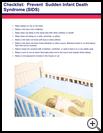
Sudden Infant Death Syndrome (SIDS)
________________________________________________________________________
KEY POINTS
- Sudden infant death syndrome, or SIDS, is the sudden unexplained death of a sleeping baby under 1 year of age.
- To help prevent SIDS, always put your baby to sleep on his or her back on a firm surface such as a crib mattress. There should be no soft toys, pillows, blankets, or bumpers in the baby's crib.
- Breastfeeding and using pacifiers may also help prevent SIDS.
________________________________________________________________________
What is SIDS?
Sudden infant death syndrome, or SIDS, is the sudden unexplained death of a sleeping baby under 1 year of age. SIDS is the most common cause of death in babies between 1 month and 1 year of age in the United States.
What is the cause?
The exact cause of SIDS is not known. The risk is greater if:
- The baby sleeps face down or on his or her side, sleeps with soft bedding, sleeps in a bed with others, or is overheated when sleeping
- The mother smokes, drinks, or uses drugs before or after the baby is born
- The baby was born premature, or has a brother or sister who died of SIDS
- The baby is a boy
Immunizations (baby shots) do not cause SIDS.
How can I help prevent SIDS?
To help prevent SIDS:
- Be sure you put your baby to sleep on his or her back. Follow the ABCs of safe sleep: “Alone on the Back in a bare Crib.”
- Have your baby sleep in a crib made just for infants. The mattress should be firm. Don’t let your baby sleep in the same bed with other children or adults, or on a sofa, armchair, or pillow.
- Do not place soft toys or extra pillows in your baby's crib.
- Do not use loose blankets or other covers in your baby's crib. If you do use a blanket, tuck it in so that your baby's face will not be covered. Never let your sleeping baby's head be covered with a blanket, comforter, or quilt in the crib or in a car safety seat.
- Breast-feed if you can. Studies show that breast-fed babies have fewer respiratory infections that may increase risk for SIDS.
- Try a pacifier if your baby is over 1 month of age. Pacifiers have been linked to a lower risk for SIDS. Do not force your baby to use a pacifier if he or she refuses.
- Do not overheat your baby's room. The room should be comfortable for an adult wearing light clothing. Your baby should not feel hot to the touch and should never be sweating while asleep.
- If you smoke, drink, or use drugs, try to quit especially if you are pregnant.
- If anyone else takes care of your child, be sure they follow these guidelines.
Baby monitors have not been shown to prevent SIDS.
For more information about SIDS contact:
- First Candle
800-221-7437
http://www.firstcandle.org
Developed by Change Healthcare.
Pediatric Advisor 2018.1 published by Change Healthcare.
Last modified: 2017-10-03
Last reviewed: 2017-03-27
Last modified: 2017-10-03
Last reviewed: 2017-03-27
This content is reviewed periodically and is subject to change as new health information becomes available. The information is intended to inform and educate and is not a replacement for medical evaluation, advice, diagnosis or treatment by a healthcare professional.
© 2018 Change Healthcare LLC and/or one of its subsidiaries

